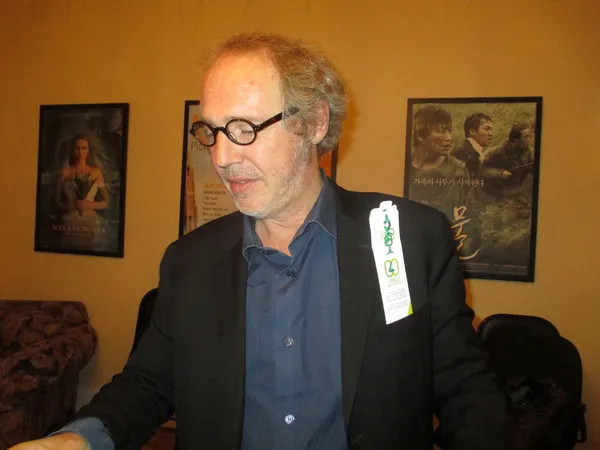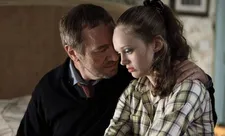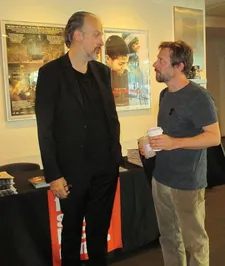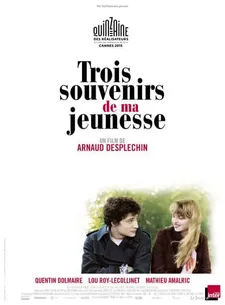 |
| Arnaud Desplechin shows off Film4Climate bracelet from Anne-Katrin Titze Photo: Anne-Katrin Titze |
Brian De Palma, Wes Anderson, De Palma directors Noah Baumbach and Jake Paltrow, along with Hitchcock/Truffaut and Festival Director Kent Jones, joined Arnaud Desplechin on the red carpet of the New York Film Festival North American premiere of My Golden Days (Trois Souvenirs De Ma Jeunesse) at Alice Tully Hall for a boys on film moment.
Roman Polanski's Tess d'Urbervilles, a Chekhovian scene, François Truffaut's autobiographical Mississippi Mermaid, Strindberg in Paris, and a theory from our previous conversation including the Under Capricorn complex come into play in our conversation.
 |
| Desplechin hero Paul Dédalus (Mathieu Amalric) |
Paul Dédalus is Mathieu Amalric in adult form and a teenage Paul (Quentin Dolmaire) has always had an affinity for plaid. Fabric samples are everywhere in Esther's (Lou Roy-Lecollinet) family home and a great big green neon sign in the shape of scissors indicates her parents' background. Roubaix is a town of fabric industry.
The sound of a flock of birds, taking off to visit faraway lands, remember? What are the sounds of your childhood? Say it thrice, for good luck. "I remember, I remember, I remember." In Desplechin's magical hands, all traces of cliché vanish, even though some of the recalled souvenirs are as old as eternity.
I presented the director with a Connect4Climate Film4Climate bracelet, which he promptly deposited into his jacket handkerchief pocket.
Arnaud jumps right into the question of how to best translate the French word "pudeur" because "modesty" or "decency" doesn't quite cut it. Same problem for finding one fitting the word for "impudeur."
Anne-Katrin Titze: Which scenes in My Golden Days would you say best represent the notion of "pudeur" and "impudeur" respectively?
 |
| A teenage Paul Dédalus (Quentin Dolmaire) with Esther (Lou Roy-Lecollinet) |
Arnaud Desplechin: I hope that the whole film is awfully "impudique". The actors when they arrive on the set, they want to give you their craft, their ability. It's nice. But if I chose them, I know that they are able, that they have a certain craft. I know that they are talented. That's a quality they already gave to other guys. What I'm asking from them is something more than to be able. Where I start to be interested is when they are unable. When they are uncomfortable, when they are intimate, when they are personal, when they are giving me something embarrassing - then I start to be interested.
In my relationship with actors, I feel obliged to behave in the same way, just to be part of them. So I hope the lines that I'm writing and the shots that I'm planning are too intimate, are embarrassing, a sort of personal view which is something that I love. It has to do with the autobiography feeling. What I mean is, It's a feeling in the sense of… I am thinking of one of my great masters, you know, François Truffaut. When you see a film by François Truffaut, you think, oh, it's too much, it's too intimate. It's just like a self-portrait. It's so embarrassing and sometimes the films are very novelistic.
 |
| Paul's father (Olivier Rabourdin) and sister Delphine (Lily Taieb) |
I was thinking about the Mississippi Mermaid, which is depicting the relation of this fragile man with this powerful woman. And you think, "oh Truffaut, you are speaking about yourself." It's a self-portrait, it's so embarrassing. So it's a burning thing I am asking from the actors. And I feel obliged to give that in the same way and trying to be a good actor among good actors. You know? Not just to give my craft but to give a personal view.
AKT: So you are sharing your embarrassment passport [in reference to an episode in My Golden Days] and giving it to the actors who are then using it and traveling with it?
AD: Yes, yes.
AKT: A scene I liked a lot was when, almost in a reversal of parent - child roles, the father stays in his room during a party.
AD: With his daughter?
AKT: Yes, she comes to him.
AD: "Am I that ugly?" The Chekhovian scene?
AKT: Yes. Is that Chekhov?
 |
| Kent Jones with My Golden Days and Jimmy P star Mathieu Amalric Photo: Anne-Katrin Titze |
AD: Yes. It's Vanya. It's not exactly the same situation because in Chekhov it's between two women, here it's between the father (Olivier Rabourdin) and the daughter (Lily Taieb). You know, why am I misfit? Because you are my father! A question unable to answer. Strangely enough, there is tenderness. I love this character, I love the actor playing the part. The first time you can see him he is like a monster, beating his son (Quentin Dolmaire). After that when you see him again he is with his daughter and in a way is so nice.
Even if he is unable to save her, he is really nice and warm. And the last time you see the character is as if he were saying goodbye to the film. I love this gesture because I invented it and the actors stole it from me. [Arnaud is playing it out for me] He is entering the room to take something and Esther is saying "Hello, Sir" and he is saying "Sorry" and he is going backwards [Arnaud does so] outside the room.
AKT: Now you gave me the cue to tie it in with our previous conversation about the fact that he is not able to save his daughter. This was your theory that man becomes man by not saving the woman and woman becomes woman by killing a man. Is My Golden Days a continuation or is it really concerned with something else?
AD: I don't think that Esther is a woman killing a man. She's not that type of girl. It's funny, I recently worked for the stage. I did a production of Père, Father, the Strindberg play which opened one week ago, so it's quite fresh in my memory. It was the first time I was working for the stage. I thought I would never do such a thing.
AKT: In Paris?
 |
| Trois Souvenirs De Ma Jeunesse poster |
AD: In Paris at the Comédie-Française. And there was this character of a woman dealing with her guilt, guilt of killing a man. This character, as we discussed, I loved it in Under Capricorn. Which is one of the characters that marks me for the rest of my days, which is so important for me. But I don't think Esther has anything to do with guilt. Guilt is a word that she ignores absolutely. So there's no story here about killing or not killing. She doesn't give a damn. She is not guilty. Her tragedy is a different kind of tragedy. Can I say some more about that?
AKT: Please!
AD: It's still about things we discussed the first time we met. And you were speaking about that. I think it has to do with the Tess complex. The Tess thing about female characters in films.
AKT: Tess as in d'Urbervilles, Thomas Hardy? Not Test?
AD: Like the Polanski movie, Tess d'Urbervilles. The fact that Tess has this hidden wish to become a queen. Her father is a drunkard, it's the guy finding the spoon proving that the d'Urbervilles are nobles. The mother is saying, oh come on, you're not a nobleman, you're just a drunkard, we are just peasants. There is just one person in the family who is listening. It's Tess thinking, "I'm a d'Urberville". So she already wants that very tragic ending where she is condemned to death like a queen. And she wants to become that queen.
And I think that in Esther, my Esther (Roy-Lecollinet), it is so important for her to say at the museum, I'm exceptional. And I'm not exceptional for one reason. I'm not exceptionally beautiful, I'm not exceptionally clever, I'm not exceptionally cultivated. I'm not anything. I'm not a great dancer. I'm just great because I'm great.
And the love of Paul (Dolmaire) will permit her to transform her into a heroine. And so, in a way and through the reading process, I love this moment which is so tiny in the film, she is saying "Will you call me?" Paul doesn't have a phone so his answer is "Will you write to me?" And you can see Esther, because she is not a big writer, and suddenly the idea that she would become the writer of her own heroism. At the end of the movie, she becomes her own novelist. She was inventing herself as the heroine that she always wanted to become. That's what I would call the Tess complex. More than the Under Capricorn complex.
AKT: Have you seen Kent's [Jones] Hitchcock/Truffaut, yet?
AD: No, still not. When they were showing it to Mathieu [Amalric], because Mathieu did the voiceover in the French version, I was busy because I was finishing the mix, so I missed it.
AKT: I have not seen it yet, either. But I will soon.
AD: I think it's really great. My girlfriend saw it and I can see in his [Kent's] eyes that he's proud. It's showing in four weeks in France, so I will see it at the Cinémathèque.
Read Arnaud Desplechin revealing how André Dussollier becomes a smiling Ernst Lubitsch devil out of Heaven Can Wait, on location scouting in Roubaix, green Alfred Hitchcock scissors, a beloved's handkerchief, acting out for the actors, John Ford and a less heroic form of male bonding.
My Golden Days will screen at the London Film Festival on Saturday, October 17 and Sunday, October 18 in the Love section.





















